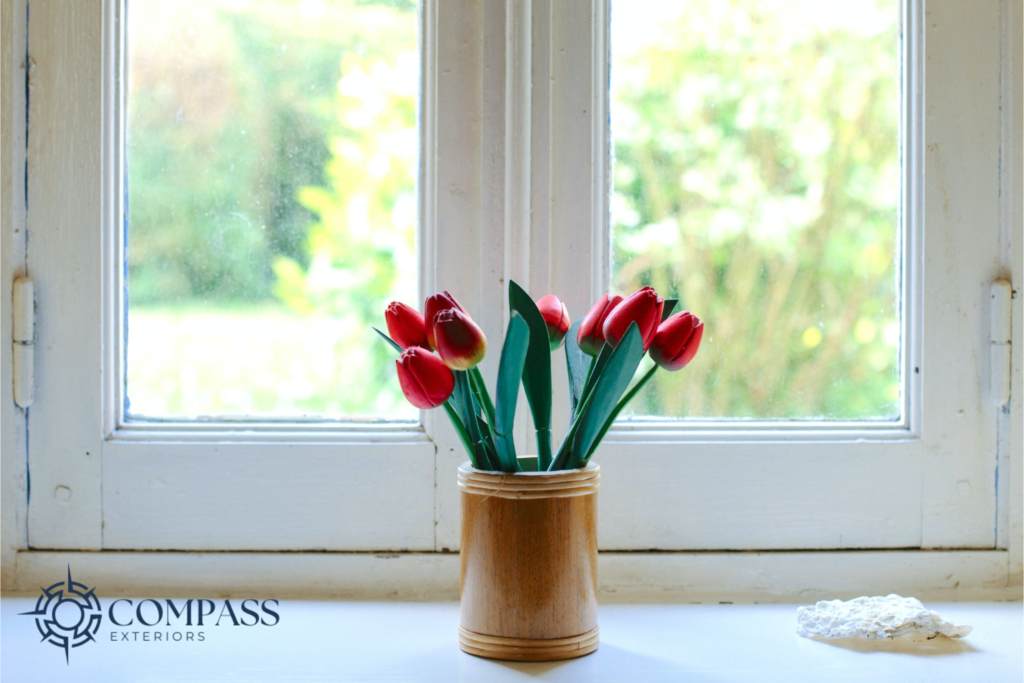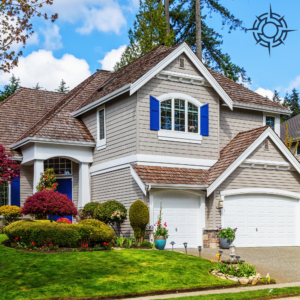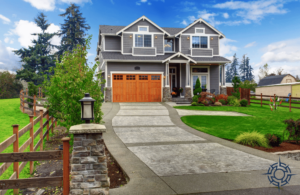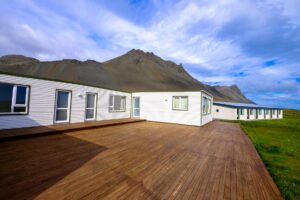As Minnesota homeowners, preparing for the winter months is always a priority. A significant part of this preparation involves ensuring your home is energy-efficient and comfortable. One effective way to achieve this is through the installation of casement windows. Let’s delve into what casement windows are, why they’re a popular choice in Minnesota, and how they differ from other window types.
What are Casement Windows?

Casement windows, often referred to as crank windows, hinged windows, or swing-out windows, are a distinctive type of window. Unlike traditional sash windows, which slide up and down, casement windows are mounted on hinges at the sides and open outward. They are operated using a crank mechanism, making them easy to open and close. This design not only offers ease of use but also allows for a tight seal when closed, which is essential for energy efficiency.
Why are Casement Windows Popular in Minnesota?
In the chilly climate of Minnesota, keeping homes warm and energy bills low is a constant challenge. Casement windows excel in this regard due to their design. When closed, the window sash presses tightly against the frame, creating an airtight seal. This seal prevents cold air from entering and warm air from escaping, thus maintaining a comfortable indoor temperature and reducing heating costs. Additionally, their ability to fully open provides excellent ventilation during milder days, making them versatile for both winter and summer months.
What Makes Casement Windows Different from Other Window Types?
The unique features of casement windows set them apart from other window types:
- Enhanced Energy Efficiency: The airtight seal of casement windows is superior to that of sliding or double-hung windows, making them more energy-efficient. This is particularly beneficial in colder climates like Minnesota, where preventing heat loss is crucial.
- Optimal Ventilation: Casement windows can open completely, as opposed to the partial opening of standard sash windows. This allows for better air circulation, which is vital for maintaining indoor air quality.
- Ease of Operation: The crank mechanism in casement windows makes them easier to open and close, especially in hard-to-reach areas. This feature is not only convenient but also ensures that the windows can be tightly closed.
- Superior Views and Lighting: With fewer mullions and frames, casement windows offer unobstructed views and let in more natural light, enhancing the aesthetics of your home.
- Customizability and Style: Casement windows come in a variety of styles and can be customized to fit the specific aesthetic and architectural needs of your home. This flexibility allows homeowners to maintain their home’s character while upgrading its efficiency and functionality.
Pros and Cons of Casement Windows: A Comprehensive Guide for Homeowners
When it comes to selecting the right windows for your home, it’s crucial to weigh the pros and cons of different types. Casement windows, known for their unique style and functionality, are a popular choice among homeowners. In this article, we’ll explore the various advantages and potential drawbacks of casement windows, helping you make an informed decision.
Pros of Casement Windows
- Enhanced Energy Efficiency: One of the biggest advantages of casement windows is their superior energy efficiency. Their design allows for a tight seal when closed, significantly reducing air leakage. This tight seal ensures that heat stays inside during the winter and outside during the summer, thereby reducing heating and cooling costs.
- Optimal Ventilation: Casement windows are exceptional in providing ventilation. They can open fully, unlike sliding or double-hung windows, allowing for maximum air flow. This is particularly beneficial for keeping your home fresh and well-ventilated.
- Increased Security: The locking mechanism of casement windows is embedded within the frame, making them more secure against break-ins. This feature provides an added layer of security to your home.
- Longevity and Durability: Generally, casement windows are known for their longevity and require minimal maintenance. Made with robust materials, they can withstand various weather conditions, making them a durable choice for your home.
- Ease of Operation: These windows are incredibly user-friendly, especially in hard-to-reach areas. The crank mechanism makes it easy to open and close them, which is a handy feature for windows installed in higher or awkward places.
- Improved Lighting: Casement windows offer unobstructed views and allow more natural light to enter the room. This feature not only enhances the aesthetic appeal of your space but also can help reduce the need for artificial lighting during the day.
Cons of Casement Windows
- Higher Initial Cost: While casement windows are cost-effective in the long run due to their energy efficiency, their initial installation cost can be higher than other types of windows. This upfront investment might be a consideration for budget-conscious homeowners.
- Size Limitations: Casement windows are not always suitable for very large openings. Due to the mechanics of their operation, there is a limit to how large a casement window can be without compromising its structural integrity.
- Screen Compatibility: Installing screens with casement windows can be a bit more complex than with traditional windows. The screen is placed on the interior side, which can be less aesthetically pleasing and might require more frequent cleaning.
- Vulnerability in Extreme Weather: When open, casement windows can catch more wind, which could lead to damage in very windy conditions. This is a factor to consider in areas prone to high winds.
By understanding both the pros and cons, you can make a decision that best suits your home’s needs and your personal preferences. Remember, the right windows can not only improve the functionality of your home but also add to its overall appeal and value.
Comparisons and Alternatives of Casement Windows: Finding the Best Fit for Your Home
When it comes to choosing windows for your home, understanding the different types and how they compare to each other is crucial. Casement windows, popular for their unique style and functionality, have their specific set of advantages. However, they might not always be the best fit for every situation. Let’s explore how casement windows compare to other window types and identify scenarios where you might consider alternatives.
Comparing Casement Windows with Other Window Types

- Casement Windows vs. Double-Hung Windows: Double-hung windows, which slide up and down, are the traditional choice for many homes. While casement windows are great for ventilation and unobstructed views, double-hung windows are easier to clean, especially on upper floors, since both the upper and lower sashes can tilt inward. Double-hung windows are also a safer option in homes with young children, as some models can be opened from the top, reducing the risk of a child climbing out.
- Casement Windows vs. Sliding Windows: Sliding windows, as the name suggests, open by sliding horizontally. These windows are easier to operate in wider frames and are ideal for spaces where an outward opening window would be impractical, such as facing walkways or patios. Sliding windows, however, don’t seal as tightly as casement windows and may not be as energy-efficient.
- Casement Windows vs. Fixed Windows: Fixed windows don’t open at all. They are chosen for areas where ventilation is not a priority but maximizing the view is. Fixed windows offer better energy efficiency due to the lack of opening mechanisms but lack the ventilation that casement windows can provide.
When to Opt for Alternatives to Casement Windows
- Space Limitations: In areas where space is limited, such as next to walkways, patios, or decks, swinging casement windows might be impractical. Sliding or double-hung windows, which do not protrude outward, would be more suitable.
- Large Window Openings: For very large window openings, casement windows may not be structurally feasible. In such cases, combining fixed windows with operable double-hung or sliding windows can be a better option.
- Ease of Cleaning: If ease of cleaning is a priority, especially for windows on upper floors, double-hung windows are more convenient as they can be cleaned from the inside.
- Budget Constraints: If you are working with a tight budget, you might want to consider more cost-effective options. Double-hung and sliding windows typically come with a lower initial cost compared to casement windows.
- Aesthetic Preferences: Finally, the architectural style of your home and your personal taste play a significant role. For a traditional look, double-hung windows might be preferable, while for modern homes, the sleek design of casement windows could enhance the overall aesthetic.
It’s important to evaluate your specific needs and the unique characteristics of your home to make the best choice. Remember, the right windows can enhance both the functionality and the beauty of your home.
Additional Considerations for Casement Windows: Insights for Minnesota Homeowners
Casement windows, with their unique style and functionality, are an excellent choice for many homes. However, when considering these windows, especially in Minnesota, there are additional factors to keep in mind. Understanding these will help you make a well-informed decision, ensuring your windows are not just aesthetically pleasing but also safe, efficient, and suitable for your local climate.
Understanding Casement Window Egress
- Safety and Emergency Exits: One crucial aspect of casement windows is their role in emergency exits, or egress. In many homes, especially bedrooms and other sleeping areas, windows must meet specific size requirements to be considered safe for egress. Casement windows, which open fully, are often ideal for this purpose. Their large opening allows for an easy exit in case of emergencies, such as a fire.
- Regulatory Compliance: It’s important to ensure that your casement windows comply with local building codes. These codes specify the minimum width, height, and overall opening area for egress windows. Working with a knowledgeable installer can ensure that your casement windows meet these essential safety standards.
Special Considerations for Casement Windows in Minnesota
- Climate Adaptability: In Minnesota, with its unique climate challenges, choosing the right windows is crucial. Casement windows are well-suited for cold climates due to their tight seal when closed, which prevents drafts and keeps warmth in.
- Window Sash Durability: The sash of a casement window — the part that moves and holds the glass — needs to withstand the rigors of Minnesota’s weather. Look for casement windows with durable, weather-resistant sashes that can endure extreme temperatures and resist warping, shrinking, and swelling.
- Insulated Glass: For enhanced energy efficiency, consider casement windows with double or triple-pane insulated glass. This feature is particularly beneficial in Minnesota’s cold winters, as it helps in retaining heat and reducing energy costs.
Choosing the Right Partner for Casement Window Installation: Why Compass Exteriors is the Ideal Choice
Selecting the right company for installing casement windows in your home is as important as choosing the windows themselves. You need a partner who not only understands your needs but also has the expertise to deliver quality workmanship. Compass, with its stellar reputation and commitment to excellence, stands out as the ideal choice. Let’s explore why Compass is the go-to expert for casement window installation and the range of services they offer.
Why Choose Compass for Window Installation?
- Expertise and Experience: Compass boasts a team of skilled professionals with extensive experience in window installation. Their expertise ensures that your casement windows are installed with precision and care, optimizing their performance and longevity.
- High-Quality Service: Compass is known for its exceptional service quality. From the moment you reach out to them, you’ll experience a professional and customer-focused approach. They understand that every home is unique and offer personalized solutions to meet your specific needs.
- Customer Satisfaction Priority: At Compass, customer satisfaction is not just a goal; it’s a guarantee. They strive to exceed expectations at every step of the process, ensuring that you are completely satisfied with the end result. Their high rate of customer satisfaction and glowing testimonials speak volumes about their commitment to delivering the best.
- Use of Superior Materials: Compass uses only high-quality materials for all its installations. This commitment to quality means that your casement windows will not only look great but also withstand the test of time.
- Comprehensive Warranty: Understanding the importance of peace of mind, Compass offers comprehensive warranties on their installations. This warranty backs their workmanship and the materials used, giving you added assurance about your investment.
Services Offered by Compass for Casement Window Installation
- Personalized Consultation: Compass begins with a detailed consultation to understand your needs and preferences. They offer expert advice on the type of casement windows that would best suit your home’s style and your budget.
- Customization Options: They provide a wide range of customization options, from the choice of materials to finishes and styles, ensuring that your new windows blend seamlessly with your home’s aesthetics.
- Professional Installation: With a team of seasoned installers, Compass ensures a smooth and efficient installation process. They take care to minimize disruption and complete the job within the agreed timeframe.
- Maintenance Services: Post-installation, Compass offers maintenance services to ensure your windows remain in top condition. This includes check-ups and repairs, if necessary.
- Energy Efficiency Consultation: Compass also provides consultations on how to maximize the energy efficiency of your casement windows, helping you reduce energy costs and contribute to a greener environment.
Choosing Compass for your casement window installation means opting for a partner who offers expertise, quality, and customer satisfaction. Remember, the right installation partner is key to maximizing the benefits of your new windows.











